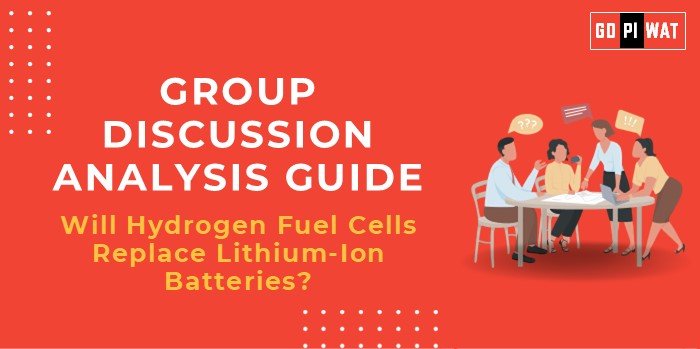📋 Group Discussion (GD) Analysis Guide: Will Hydrogen Fuel Cells Replace Lithium-Ion Batteries?
🌍 Introduction to the Topic
Opening Context: As the world transitions towards sustainable energy, the debate over hydrogen fuel cells versus lithium-ion batteries intensifies. With both technologies offering distinct advantages for decarbonizing transport and energy storage, understanding their implications is essential for future leaders.
Topic Background: Lithium-ion batteries have revolutionized portable electronics and electric vehicles (EVs) due to their high energy density. However, concerns over raw material scarcity and environmental impacts are spurring interest in hydrogen fuel cells, which produce zero emissions and promise greater efficiency in heavy-duty applications. Recent advancements in hydrogen production and storage, coupled with governmental policy support, have positioned this technology as a viable contender in the green energy race.
📊 Quick Facts and Key Statistics
- 🚗 Global EV Sales (2023): Over 10 million units, 90% powered by lithium-ion batteries.
- 💧 Hydrogen Market Growth: Predicted CAGR of 9.2%, reaching $201 billion by 2030.
- 🔋 Battery Recycling Rates: Less than 5% of lithium batteries are recycled globally.
- ⚡ Fuel Cell Efficiency: Up to 60% compared to lithium-ion batteries’ 90% charge-discharge efficiency.
🤝 Stakeholders and Their Roles
- 🏛️ Governments: Develop incentives, standards, and hydrogen infrastructure.
- 🏢 Corporations: Tesla, Toyota, and Plug Power innovate in battery and fuel cell technologies.
- 🚗 Consumers: Demand cost-effective, sustainable, and high-performance energy solutions.
- 🌱 Environmentalists: Advocate for technologies with minimal ecological footprint.
🏆 Achievements and Challenges
✨ Achievements
- 📈 Lithium-Ion Success: Revolutionized the EV market, enabling Tesla and others to scale globally.
- 🌍 Hydrogen Pilots: Countries like Japan and Germany lead in hydrogen infrastructure development.
- 📜 Policy Support: EU’s “Hydrogen Strategy” targets carbon neutrality by 2050.
⚠️ Challenges
- 🌍 Resource Constraints: Lithium and cobalt mining harms ecosystems; hydrogen storage requires advanced solutions.
- 💰 Economic Feasibility: High costs of hydrogen production versus falling battery prices.
- 🔌 Infrastructure Gaps: Hydrogen lacks widespread refueling networks compared to EV chargers.
🌏 Global Comparisons
- 🇯🇵 Japan: Extensive hydrogen infrastructure, particularly for fuel cell vehicles.
- 🇳🇴 Norway: EV adoption champion with 80% market share but exploring hydrogen for freight.
📚 Case Studies
- 🚂 Hydrogen Trains in Germany: Operational since 2022, emitting only water vapor.
- 🇮🇳 India’s EV Push: Plans to achieve 30% EV penetration by 2030, focused on lithium-ion adoption.
🗣️ Structured Arguments for Discussion
- ✅ Supporting Stance: “Hydrogen fuel cells offer unparalleled scalability for long-range, heavy-duty transport with zero emissions.”
- ❌ Opposing Stance: “Lithium-ion batteries have an established supply chain and cost advantage, making them the superior choice in the near term.”
- ⚖️ Balanced Perspective: “While lithium-ion batteries dominate light vehicle markets, hydrogen fuel cells hold promise for decarbonizing industrial transport and grid storage.”
🎯 Effective Discussion Approaches
- 📊 Opening Approaches:
- 💬 “With global lithium demand outpacing supply, hydrogen emerges as the alternative energy savior.”
- ⚡ “Norway’s EV success story shows lithium-ion’s dominance, but hydrogen may answer the heavier transport challenge.”
- 🔄 Counter-Argument Handling:
- Acknowledge lithium-ion’s dominance but stress sustainability issues.
- Highlight hydrogen’s potential with examples like hydrogen-powered buses.
🔍 Strategic Analysis of Strengths and Weaknesses
- 💪 Strengths: High efficiency (lithium-ion), scalability (hydrogen fuel cells).
- 🤔 Weaknesses: Recycling challenges (lithium-ion), high costs (hydrogen).
- 🚀 Opportunities: Global carbon-neutral targets drive demand.
- ⚠️ Threats: Resource wars, policy fluctuations.
🎓 Connecting with B-School Applications
- 🌱 Real-World Applications: Explore hydrogen or battery advancements in supply chain or renewable energy projects.
- 📝 Sample Interview Questions:
- 💬 “What are the biggest hurdles to hydrogen fuel cell adoption in India?”
- 💬 “How do you see the role of governments in the energy transition?”


